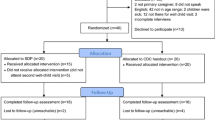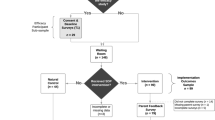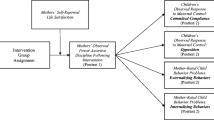Abstract
The primary care office offers an ideal setting to encourage parenting behaviors that promote early childhood development. We conducted a pilot study to establish feasibility and acceptability of Sit Down and Play (SDP), a brief primary care-based program to facilitate positive parenting behaviors through take-home play activities. A prospective 1-month study was conducted in an urban primary care clinic. SDP was administered to 30 caregivers of 6–12 month-old children while they waited for their well-child appointment. Caregivers completed baseline and 4-week follow-up surveys. Open-ended interview questions regarding acceptability and usefulness of SDP were administered and analyzed using content analysis. Parenting practices related to child development were measured with standardized measures and changes analyzed using paired t-test and linear mixed effects models. Most caregivers were mothers (90 %) and non-white (97 %); the majority of children received Medicaid (87 %). There were significant increases in parental reports of practices related to child development (p < 0.001), including families who reported low incomes (i.e. <$25,000) and received a high-school education or less (p = 0.001). Four main themes emerged from the open-ended interview data: (1) importance of play, (2) noticing a change in their child, (3) reinforcing existing positive parenting behaviors, and (4) satisfaction with the program. This preliminary study suggests that SDP is a feasible and potentially beneficial program that can be delivered during pediatric well-child visits. Further studies are needed to determine the effectiveness of SDP on parenting behaviors and developmental outcomes.
Similar content being viewed by others
References
Bandura, A. (1977). Self-efficacy: toward a unifying theory of behavioral change. Psychological Review, 84(2), 191–215.
Bandura, A. (2004). Health promotion by social cognitive means. Health Education & Behavior, 31(2), 143–164.
Bandura, A., & Schunk, D. H. (1981). Cultivating competence, self- efficacy, and intrinsic interest through proximal self-motivation. Journal of Personality and Social Psychology, 41, 586–598.
Casey, P. H., & Whitt, J. K. (1980). Effect of the pediatrician on the mother-infant relationship. Pediatrics, 65(4), 815–820.
Dreyer, B. P., Mendelsohn, A. L., & Tamis LeMonda, C. S. (1996). Assessing the child’s cognitive home environment through parental report; reliability and validity. Early Development and Parenting, 5(4), 271–287.
Duncan, G. J., Dowsett, C. J., Claessens, A., Magnuson, K., Huston, A. C., Klebanov, P., Pagani, L. S., Feinstein, L., Engel, M., Brooks-Gunn, J., Sexton, H., Duckworth, K., & Japel, C. (2007). School readiness and later achievement. Developmental Psychology, 43(6), 1428–1446.
Dworkin, P. H. (2004). Anderson Aldrich award lecture: enhancing developmental services in child health supervision--an idea whose time has truly arrived. Pediatrics, 114(3), 827–831.
Engle, P. L., & Black, M. M. (2008). The effect of poverty on child development and educational outcomes. Annals of the New York Academy of Sciences, 1136, 243–256.
Fernald, A., Marchman, V. A., & Weisleder, A. (2012). SES differences in language processing skill and vocabulary are evident at 18 months. Developmental Science, 16(2), 234–248.
Fitzmaurice, G. M., Laird, N. M., & Ware, J. H. (2012). Applied longitudinal analysis (Vol. 998). Hoboken, New Jersey: Wiley.
Goldfeld, S., Napiza, N., Quach, J., Reilly, S., Ukoumunne, O. C., & Wake, M. (2011). Outcomes of a universal shared reading intervention by 2 years of age: the let’s read trial. Pediatrics, 127(3), 445–453.
Goldfeld, S., Quach, J., Nicholls, R., Reilly, S., Ukoumunne, O. C., & Wake, M. (2012). Four-year-old outcomes of a universal infant-toddler shared reading intervention, the let’s read trial. Archives of Pediatrics & Adolescent Medicine, 166(11), 1045–1052.
Gollwitzer, P. M. (1999). Implementation intentions: strong effects of simple plans. American Psychologist, 54(7), 493.
Grantham-McGregor, S., Cheung, Y. B., Cueto, S., Glewwe, P., Richter, L., & Strupp, B. (2007). Developmental potential in the first 5 years for children in developing countries. The Lancet, 369(9555), 60–70.
Hackman, D. A., Farah, M. J., & Meaney, M. J. (2010). Socioeconomic status and the brain: mechanistic insights from human and animal research. Nature Reviews Neuroscience, 11, 651–659.
Halle, T., Forry, N., Hair, E., Perper, K., Wander, L., Wessel, J., & Vick, J. (2009). Disparities in early learning and development: lessons from the early childhood longitudinal study-birth cohort (ECLS-B). Washington, DC: Child Trends.
Hart, B., & Risley, T. R. (1995a). Meaningful differences in the everyday experience of young American children. Baltimore: Paul H Brookes Pub Co.
Heckman, J. J., Moon, S. H., Pinto, R., Savelyev, P. A., & Yavitz, A. (2010). The rate of return to the high/scope perry preschool program. Journal of Public Economics, 94(1-2), 114–128.
Hedeker, D., & Gibbons, R. D. (2006). Longitudinal data analysis (Vol. 451). John Wiley & Sons.
High, P. C., LaGasse, L., Becker, S., Ahlgren, I., & Gardner, A. (2000). Literacy promotion in primary care pediatrics: can we make a difference?. Pediatrics, 105(4 Pt 2), 927–934.
Hsieh, H. F. (2005). Three approaches to qualitative content analysis. Qualitative Health Research, 15(9), 1277–1288.
Klass, P., Dreyer, B. P., & Mendelsohn, A. L. (2009). Reach out and read: literacy promotion in pediatric primary care. Advances in Pediatrics, 56(1), 11–27.
Landry, S. H., Smith, K. E., & Swank, P. R. (2006). Responsive parenting: establishing early foundations for social, communication, and independent problem-solving skills. Developmental Psychology, 42(4), 627–642.
Landry, S. H., Smith, K. E., Swank, P. R., & Guttentag, C. (2008). A responsive parenting intervention: the optimal timing across early childhood for impacting maternal behaviors and child outcomes. Developmental Psychology, 44(5), 1335–1353.
Larson, K., Russ, S. A., Nelson, B. B., Olson, L. M., & Halfon, N. (2015). Cognitive ability at kindergarten entry and socioeconomic status. Pediatrics, 135(2), e440–e448.
Love, J. M., Chazan-Cohen, R., Raikes, H., & Brooks-Gunn, J. (2013). What makes a difference: early head start evaluation findings in a developmental context. Monographs of the Society for Research in Child Development, 78(1), vii–viii. – 1–173.
Mendelsohn, A. L., Dreyer, B. P., Flynn, V., Tomopoulos, S., Rovira, I., Tineo, W., et al. (2005). Use of videotaped interactions during pediatric well-child care to promote child development: a randomized, controlled trial. Journal of Developmental and Behavioral Pediatrics: JDBP, 26(1), 34–41.
Mendelsohn, A. L., Huberman, H. S., Berkule, S. B., Brockmeyer, C. A., Morrow, L. M., & Dreyer, B. P. (2011). Primary care strategies for promoting parent-child interactions and school readiness in at-risk families: the Bellevue project for early language, literacy, and education success. Archives of Pediatrics & Adolescent Medicine, 165(1), 33–41.
Mendelsohn, A. L., Mogilner, L. N., Dreyer, B. P., Forman, J. A., Weinstein, S. C., Broderick, M., et al. (2001). The impact of a clinic-based literacy intervention on language development in inner-city preschool children. Pediatrics, 107(1), 130–134.
Mendelsohn, A. L., Valdez, P. T., Flynn, V., Foley, G. M., Berkule, S. B., Tomopoulos, S., et al. (2007). Use of videotaped interactions during pediatric well-child care: impact at 33 months on parenting and on child development. Journal of Developmental and Behavioral Pediatrics: JDBP, 28(3), 206–212.
Minkovitz, C. S., Hughart, N., Strobino, D., Scharfstein, D., Grason, H., Hou, W., Miller, T., Bishai, D., Augustyn, M., & McLearn, K. T. (2003). A practice-based intervention to enhance quality of care in the first 3 years of life. The Journal of the American Medical Association, 290(23), 3081–3091.
Minkovitz, C. S., Strobino, D., Mistry, K. B., Scharfstein, D. O., Grason, H., Hou, W., et al. (2007). Healthy Steps for young children: sustained results at 5.5 Years. Pediatrics, 120(3), e658–e668. doi:10.1542/peds.2006-1205.
Moore, C. G., Carter, R. E., Nietert, P. J., & Stewart, P. W. (2011). Recommendations for planning pilot studies in clinical and translational research. Clinical and Translational Science, 4(5), 332–337.
National Institute of Child Health and Human Development Early Child Care Research Network. (2005). Duration and developmental timing of poverty and children’s cognitive and social development from birth through third grade. Child Development, 76(4), 795–810.
Needlman, R., Fried, L. E., Morley, D. S., Taylor, S., & Zuckerman, B. (1991). Clinic-based intervention to promote literacy. A pilot study. American Journal of Diseases of Children (1960), 145(8), 881–884.
Noble, K. G., McCandliss, B. D., & Farah, M. J. (2007). Socioeconomic gradients predict individual differences in neurocognitive abilities. Developmental Science, 10(4), 464–480.
Olds, D. L., Eckenrode, J., Henderson, C. R. J., Kitzman, H., Powers, J.,Cole, R., et al. (1997). Long-term effects of home visitation on maternal life course and child abuse and neglect. Fifteen-year follow-up of a randomized trial. The Journal of the American Medical Association, 278(8), 637–643.
Olds, D. L., Sadler, L., & Kitzman, H. (2007). Programs for parents of infants and toddlers: recent evidence from randomized trials. Journal of Child Psychology and Psychiatry, 48(3-4), 355–391.
Paradis, H. A., Sandler, M., Manly, J. T., & Valentine, L. (2013). Building healthy children: evidence-based home visitation integrated with pediatric medical homes. Pediatrics, 132(Supplement), S174–S179.
Rodriguez, E. T., Tamis LeMonda, C. S., Spellmann, M. E., Pan, B. A., Raikes, H., Lugo-Gil, J., & Luze, G. (2009). The formative role of home literacy experiences across the first three years of life in children from low-income families. Journal of Applied Developmental Psychology, 30(6), 677–694.
Shah, R., Kennedy, S., Clark, M. D., Bauer, S. C., & Schwartz, A. (2016). Primary care–based interventions to promote positive parenting behaviors: a meta-analysis. Pediatrics, 137(5), e20153393.
Shah, R., Sobotka, S. A., Chen, Y. -F., & Msall, M. E. (2015). Positive parenting practices, health disparities, and developmental progress. Pediatrics, 136(2), 318–326.
Sharif, I., Rieber, S., Ozuah, P. O., & Reiber, S. (2002). Exposure to reach out and read and vocabulary outcomes in inner city preschoolers. Journal of the National Medical Association, 94(3), 171–177.
Shonkoff, J. P., & Garner, A. S., The Committee on Psychosocial Aspects of Child and Family Health, Committee on Early Childhood, Adoption, and Dependent Care, and Section on Developmental and Behavioral Pediatrics. (2011). The lifelong effects of early childhood adversity and toxic stress. Pediatrics, 129(1), e232–e246.
Speziale, H. J., & Carpenter, D. R. (2007). Qualitative research in nursing. 4th edition Philadelphia, PA: Lippincott Williams & Wilkins.
Tamis LeMonda, C. S., Shannon, J. D., Cabrera, N. J., & Lamb, M. E. (2004). Fathers and mothers at play with their 2- and 3-year-olds: contributions to language and cognitive development. Child Development, 75(6), 1806–1820.
Taylor, J. A., Davis, R. L., & Kemper, K. J. (1997). A randomized controlled trial of group versus individual well child care for high-risk children: maternal-child interaction and developmental outcomes. Pediatrics, 99(6), e9–e9.
Tomopoulos, S., Dreyer, B. P., Tamis-LeMonda, C., Flynn, V., Rovira, I., Tineo, W., & Mendelsohn, A. L. (2006). Books, toys, parent-child interaction, and development in young Latino children. Ambulatory Pediatrics: The Official Journal of the Ambulatory Pediatric Association, 6(2), 72–78.
Weisleder, A., Cates, C. B., Dreyer, B. P., Berkule Johnson, S., Huberman, H. S., Seery, A. M., et al. (2016). Promotion of positive parenting and prevention of socioemotional disparities. Pediatrics, 137(2), 1–9.
Zaveri, Heather, Burwick, Andrew, & Maher, Erin (2014). Costs of early childhood home visiting: an analysis of programs implemented in the supporting evidence-based home visiting to prevent child maltreatment initiative. Mathematica Policy Research, 2014, 1–108.
Zigler, E., Pfannenstiel, J. C., & Seitz, V. (2008). The parents as teachers program and school success: a replication and extension. Journal of Primary Prevention, 29(2), 103–120.
Zuckerman, B., & Khandekar, A. (2010). Reach out and read: evidence based approach to promoting early child development. Current Opinion in Pediatrics, 22(4), 539–544.
Funding
The work described has been supported through funding provided by the National Center for Advancing Translational Sciences, National Institutes of Health, through Grant UL1TR000050. The funding source had no involvement in the study design; in the collection, analysis and interpretation of date; in the writing of the report; and in the decision to submit the article for publication.
Author information
Authors and Affiliations
Corresponding author
Ethics declarations
Conflict of Interest
The authors declare that they have no conflict of interest.
Rights and permissions
About this article
Cite this article
Shah, R., DeFrino, D., Kim, Y. et al. Sit Down and Play: A Preventive Primary Care-Based Program to Enhance Parenting Practices. J Child Fam Stud 26, 540–547 (2017). https://doi.org/10.1007/s10826-016-0583-6
Published:
Issue Date:
DOI: https://doi.org/10.1007/s10826-016-0583-6




